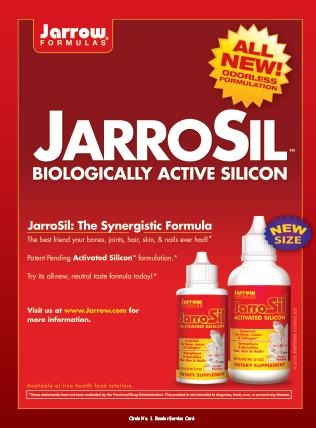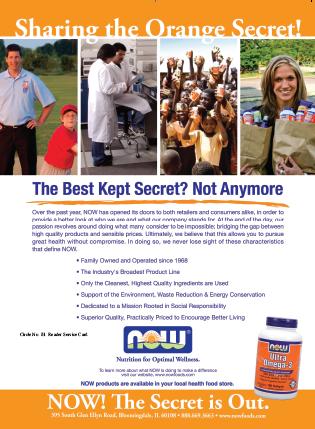Achoo! Sneezing, sniffling and breathing discomfort—the thought of pollen and other allergens is enough to make any allergy sufferer cringe at the thought of allergy season. Much to their chagrin, sufferers are often in constant search of good seasonal allergy relief. Luckily for them, the natural products industry has much to offer.
The Truth about Asthma and Allergies
More than 50 million Americans agonize over allergies each year. In fact, nearly 55% of all U.S. citizens test positive for one or more allergens, which trigger an abnormal reaction by the immune system (1). It is not uncommon for allergies to spring up during any season, but the most common times for allergies to occur are spring and fall. Allergens can be triggered by both indoor (including molds, mildew, dust mites and pet dander) and outdoor sources (like grass, trees and weed pollens). 
Some 70% of allergy sufferers also have asthma, a chronic respiratory disease often triggered by allergens (1). Asthma is usually marked by shortness of breath, coughing and chest congestion. Asthma is one of the most chronically recognized conditions, which affects both adults and children alike. In fact, 34.1 million Americans suffer from asthma, including almost 9% of all children. Consequently, almost 3,400 deaths reported from asthma in 2005 (1).
Remedies for the Masses
Whether taken as needed, four-times daily or once every 12 hours, traditional allergy and asthma drugs can make you feel relief almost instantly. But these drugs also come with many lingering side effects. These inconveniences can range from moderate to severe and can include anything from having a fast or unsteady heart rate, to rapid weight gain, to feeling drowsy and headachy. On the other hand, natural allergy and asthma remedies can provide seasonal allergy relief with no troubling aftermaths. Seeing the benefits of these products, many merchandisers are now opting to carry natural or homeopathic options in this important category.
A Powerful Antioxidant
Take quercetin, for example, which is a highly powerful antioxidant and anti-inflammatory aid. Research has indicated that quercetin’s antihistamine properties can help to relieve seasonal allergy and asthma symptoms. In those with allergy-induced asthma, researchers have found that quercetin helps stop the release of cells that cause inflammation in the lungs and shortness of breath. In addition, data collected in a small animal trial indicate that quercetin is a potent inhibitor of histamines (2).
Butterbur at its Best
Butterbur is another powerful aid used against allergies and asthma as well as other ailments like migraines. In a 2006 study of 580 patients, researchers found this herbal supplement was effective, tolerable and improved the quality of life of seasonal allergy sufferers (by 80%, 92% and 80%, respectively) after just two weeks. Of note, 44% of the participants were given an allergy medication, but the drug did not outperform butterbur with better results. In sum, the researchers conclude butterbur supplements are “safe and efficacious in the treatment of patients with seasonal allergic rhinitis (3).
More Omega-3s, Please!
Omega-3 fatty acids are another important supplement for allergy sufferers, and researchers recently may have discovered why. In August 2008, researchers at Brigham and Women’s Hospital and Harvard Medical School in Boston published research indicating that the particle Resolvin E1 (RvE1) in omega-3 fatty acids may aid in preventing the onset of asthma. Interleukin 23 (IL-23), they explain, is a crucial factor in creating chronic inflammation and is controlled by mediators such as RvE1. The researchers said their study offers “evidence that RvE1, in nanogram quantities, promoted the resolution of inflammatory airway responses in part by directly suppressing the production of IL-23 and IL-6 in the lung.” Also contributing to the positive effects of RvE1 treatment were higher concentrations of interferon-gamma in the lungs of RvE1-treated mice.
“Our findings indicate a pivotal function for IL-23 and IL-6, which promote the survival and differentiation of IL-17-producing T helper cells, in maintaining inflammation and also identify an RvE1-initiated resolution program for allergic airway responses,” the researchers stated. Various studies have also shown that high levels of omega-3 fatty acids can reduce asthmatic symptoms (4).
Help from Carotenoids
Retailers should be sure to point allergy and asthma sufferers to their offerings of carotenoids, a group of naturally occurring pigments, whose chemical components are similar to those of carotene. Research suggests that a diet rich in carotenoids may help significantly reduce the risk of adult asthma.
For example, scientific evidence published in the Journal of Asthma suggests that the carotenoid lycopene and antioxidant vitamins have significant antioxidant and protective effects against asthma. In a study of 96 people, researchers found that blood levels of vitamin A and lycopene were much lower in asthmatics than healthy individuals. The authors conclude, “Dietary supplementation or adequate intake of lycopene and vitamin A rich foods may be beneficial in asthmatic subjects” (5). Other studies have indicated that even when given the same diet, asthmatics have lower levels of total carotenoids, lycopene, lutein, beta-cryptoxanthin, alpha-carotene and beta-carotene; therefore, supplementation of carotenoids may be beneficial to asthma sufferers (6).
Benefits of Vitamin E
Vitamin E supplementation may help decrease the number of asthma-and allergy-related cases, say researchers. A new study published in Free Radical Research in April 2008 theorizes that alpha-tocopherol (alpha-T) decreases oxidative stress and thus may eliminate the allergic inflammatory process. Previous research has also indicated, “vitamin E intake was associated with lower serum IgE concentrations and a lower frequency of allergen sensitization” (7). Other recent research has indicated that children are more likely to wheeze if their mothers had low vitamin E intake during pregnancy (8).

The Saline Solution
Saline mists may be useful for allergy sufferers with clogged nasal passages. This method aids in creating moisture inside the nose and helps to dissolve and soften thick mucus membranes. In turn, the saline mist helps relieve stuffiness and creates easier breathing passageways. Saline mists contain a purified salt solution often called a sodium chloride solution, but usually do not contain any active ingredients. According to The Asthma Center, saline can be administered in a variety of ways; it can be sprayed into each nostril, sniffed or squirted in with a bulb syringe. After entering the nostrils, the saline can exit through the nose or go to the back of the throat. Neti pots, which are becoming increasingly popular, can also be used to improve nasal irrigation and clear the sinuses with a saline solution (9).
Maximizing Magnesium’s Value
Minerals and supplements are just as helpful in aiding with allergies and asthma as vitamins and antioxidants. One mineral that is very useful is magnesium. Magnesium is said to be a natural bronchodilator and anti-histamine. It is praised for its ability to impede asthma symptoms and improve recovery from asthma attacks. Researchers have discovered that inhaling magnesium in nebulized form is as effective as conventional salbutamol (the international generic name for albuterol) in defeating bronchial constrictions during severe asthma attacks (10).
On the supplement side, it’s important to note that there is a correlation between low magnesium levels and airyway spasms. In fact, researchers say magnesium deficiency is “surprisingly common” among asthmatics (65%) who require a hospital stay to control an attack. Magnesium’s mechanism of action may be that “as a calcium antagonist, it relaxes airway and smooth muscles and dilates the lungs. It also reduces inflammation, inhibits chemicals that cause spasm and increases anti-inflammatory substances such as nitric oxide” (11).
Whether at the beginning or end of allergy season, allergies and asthma can make seasonal changes almost unbearable. However, natural remedies can make allergy season much easier to cope with. Natural remedies provide a safe and effective way for suffers to find relief without some of the side effects that
traditional drugs offer. WF
References
1. American Academy of Allergy, Asthma & Immunology, www.aaaai.org, accessed January 22, 2009.
2. F.M. Painter, “Quercetin: A Review of Clinical Applications,” www.chiro.org/nutrition/ABSTRACTS/Quercetin_A_Reviews.html, accessed January 22, 2009.
3. R. Käufeler, et al., “Efficacy and Safety of Butterbur Herbal Extract Ze 339 in Seasonal Allergic Rhinitis: Postmarketing Surveillance Study,” Adv Ther. 23 (2), 373–384 (2006).
4. O. Haworth, et al., “Resolvin E1 Regulates Interleukin 23, Interferon-Gamma and Lipoxin A4 to Promote the Resolution of Allergic Airway Inflammation,” Nat. Immunol. 9 (8), 873-879 (2008).
5. G. Riccioni, et al., “Plasma Lycopene and Antioxidant Vitamins in Asthma: The PLAVA Study,” J. Asthma 44 (6), 429–432 (2007).
6. L.G. Wood, et al., “Airway and Circulating Levels of Carotenoids in Asthma and Healthy Controls,” J. Am. Coll. Nutr. 24 (6), 448-455 (2005).
7. A. Fogart, et al., “Dietary Vitamin E, IgE Concentrations, and Atopy,” Lancet 356 (9241), 1573-1574 (2000).
8. D.J. DeNoon “Vitamin E in Pregnancy May Affect Kids’ Asthma,” www.webmd.com/news/20060901/pregnancy-diet-may-affect-kids-asthma, accessed January 27, 2009.
9. Himalayan Institute, www.himalayaninstitute.org/Netipot/NetiPotinteriorcontent.aspx?id=1095, accessed January 27, 2009.
10. S. Mohammed and S. Goodacre, “Intravenous and Nebulised Magnesium Sulphate for Acute Asthma: Systematic Review and Meta-Analysis,” Emerg. Med. J. 24 (12), 823–830 (2007).
11. C. Dean, The Magnesium Miracle (Ballantine Books, New York, NY, 2007).
Published in WholeFoods Magazine, March 2009









